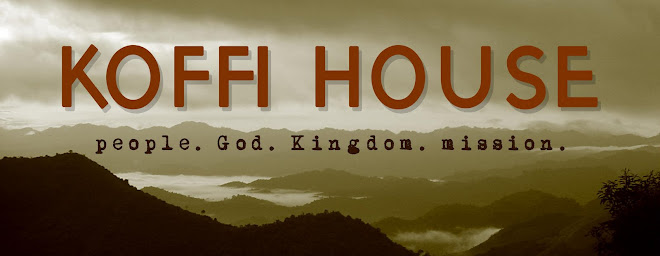Okay, I hope I don't lose all of you on this...
It occurred to me the other day when I was taking a shower.... The People (those who live here in The Location) would probably be described by those who study such things as pre-modern. Of course, The Location, like all countries, is a complex society and you could describe certain segments of the population and mostly modernists, and even a few as post-modernists. But the average, paddy and upland farming families--along with those who sell things at the market and drive motorcycle taxis--would best be describe as pre-modernists.
What are these three things? (Pre-modernism, modernism and post-modernism) Endless things have been written about this subject and the more you read the more confusing and boring it becomes. But to gain a basic understanding of these three concepts you have to begin by describing modernism.
Modernism is the idea or worldview that assumes the existence of absolute or universal truth. In physics, we call this the Grand Unified Theory (GUT)--something that physicists assume exists and once understood will tie everything they know about the laws of our physical world together. In philosophy and religion, it is the existence of a "meta-narrative"-- a story or a system of thought that explains how the world works--and how those who don't agree with this system of thought fit into it as well. Modernism lends itself to science, unity, reason, "progress" and the pursuit of objectivity.
Post-modernism is basically a reaction to modernism and the idea that there is universal truth. Truth is relative. There are no over-arching "meta-narratives" that explain everything. It is the rejection of objectivity as an absolute possibility and the embracing of subjectivity. Therefore, post-modernism lends itself to the creative arts, diversity and plurality.
Pre-modernism would describe, then, societies who have yet to embrace modernism. Basically, pre-modernism exists where there tends to be ignorance of scientific explanations for social and physical phenomena. Understanding of the world is obtained through mythology, legend, proverbs, and oral histories handed down from previous generations.
Post-modernism lends itself to individualism; modernism lends itself to the idea of progressing toward universal conformity; and pre-modernism lends itself to tribal grouping.
So, what does all of this have to do with missions?
Tons.
Most Christian missionaries would be firmly in the modernist camp. Kind of a necessity, really, if you believe you have a universal gospel (which acts as a meta-narrative) you want all peoples to accept. Evangelical missionary work is the epitome of belief in absolute truth. But there are obstacles when we seek to share this message with people in each of the three worldviews.
When speaking with post-modernists we often appeal to the idea of absolute truth as if they believe in such a thing, only a different one, when in fact they don't even believe in the concept of there being one narrative that is true for all people.
When speaking with modernists we find that they have often rejected religion as an antiquated and superstitious approach to life.
When speaking with pre-modernists we tend to make logical points and give rational explanations of concepts when stories would communicate much better.
I could spend many posts just talking about missionary approaches depending on modernist worldviews.
But what hit me in the shower the other day was that where someone is at in terms of modernism (whether they are pre, modern, or post) has a lot to do with economics and wealth.
In places where there is widespread poverty (such as in The Location) people are mostly concerned with one thing: How are they going to make money. Poverty is an ever-present reality. The escape from poverty is more a dream and a desire than an expectation. People feel "the pain of poverty" that we are mostly unaware of in the West. Consequently, the focus of their minds rarely ventures away from the concern of immediate benefit. Exploring scientific theories and considering abstract ideas isn't going to put food on the table tonight, so why waste time doing it? Poverty and under-development, therefore, tends to hold people in pre-modernism. In fact, societies that we would describe as being predominately "pre-modern" are those that are undeveloped, poor and more tribal/traditional in nature.
In places where there is rapid development (think the USA in the 50's, or China in the present) there is economic hope. People can expect to make a good living if they just work hard. Opportunity exists. They are witnessing "progress" all around them. Children are growing up doing better financially than their parents did and living at a higher standard of living. This tends to a modernist worldview.
In places that have already been developed for a generation or more (think present US and Europe), the increase of wealth has stagnated. While children grow up relatively wealthy and don't have to worry about where their next meal is going to come from, they also grow up NOT doing better financially than their parents, and in many cases, worse. But because of being accustomed to wealth (and perhaps taking it for granted), people do not pursue occupations based on what they think their income will be, but more based on what ever fancies their interest. There is not a sense of progress and destiny, but a sense of "been there, done that" boredom. This tends to a post-modernist worldview.
Recently a Christian university professor visited The Location. As he shared about evangelism and how we bring people who are far away from God to become Christians, he described a spectrum of places people might be at in relationship to becoming followers of Christ. At one end was they fully accept Christ and submit to him as Lord and Savior. At the other end, however, he described someone as being atheist--not believing in the existence of God.
Here in The Location that is not really the spectrum. The far end of the spectrum would better be described as those who are disinterested in God as they are pursuing wealth.
Subscribe to:
Post Comments (Atom)










No comments:
Post a Comment